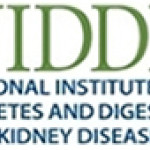- Industry: Government; Health care
- Number of terms: 17329
- Number of blossaries: 0
- Company Profile:
The National Institute of Diabetes and Digestive and Kidney Diseases (NIDDK) conducts and supports research on many of the most serious diseases affecting public health. The Institute supports much of the clinical research on the diseases of internal medicine and related subspecialty fields, as ...
Low blood pressure or a sudden drop in blood pressure. Hypotension may occur when a person rises quickly from a sitting or reclining position, causing dizziness or fainting.
Industry:Health care
One of the two bean-shaped organs that filter wastes from the blood. The kidneys are located near the middle of the back, one on each side of the spine. They create urine, which is delivered to the bladder.
Industry:Health care
One of the three main nutrients in food. Foods that provide carbohydrate are starches, vegetables, fruits, dairy products, and sugars.
Industry:Health care
One of several approaches for diabetes meal planning. Foods are categorized into three groups based on their nutritional content. Lists provide the serving sizes for carbohydrates, meat and meat substitutes, and fats. These lists allow for substitution for different groups to keep the nutritional content fixed.
Industry:Health care
Of or relating to the kidneys. A renal disease is a disease of the kidneys. Renal failure means the kidneys have stopped working.
Industry:Health care
Nerve damage that affects the feet, legs, or hands. Peripheral neuropathy causes pain, numbness, or a tingling feeling.
Industry:Health care
Moving the islets from a donor pancreas into a person whose pancreas has stopped producing insulin. Beta cells in the islets make the insulin that the body needs for using blood glucose.
Industry:Health care
A unit of measure that shows the concentration of a substance in a specific amount of fluid. In most of the world, except for the united states, blood glucose test results are reported as mmol/l. In the united states, milligrams per deciliter (mg/dl) is used. To convert to mmol/l from mg/dl, divide mg/dl by 18. Example: 180 mg/dl ÷ 18 = 10 mmol/l.
Industry:Health care
A unit of measure that shows the concentration of a substance in a specific amount of fluid. In the united states, blood glucose test results are reported as mg/dl. Medical journals and other countries use millimoles per liter (mmol/l). To convert to mg/dl from mmol/l, multiply mmol/l by 18. Example: 10 mmol/l × 18 = 180 mg/dl.
Industry:Health care
